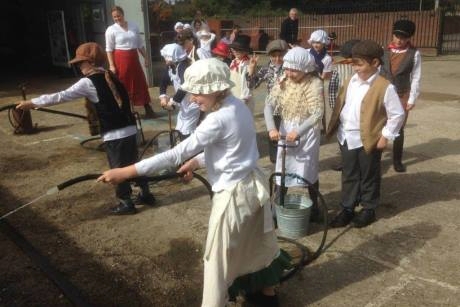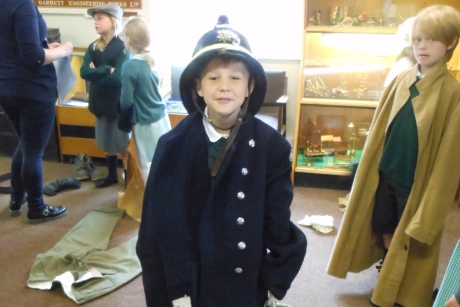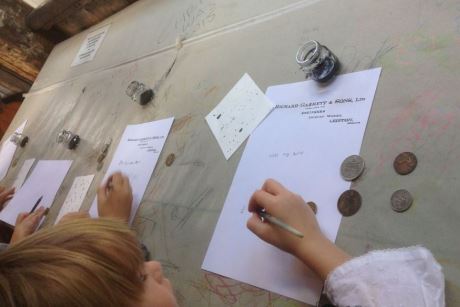
The Suffolk-based Long Shop Museum offers a learning programme for Key Stage 2 pupils that focuses on the Industrial Revolution. School Travel Organiser finds out more.
The Long Shop Museum is an industrial museum in the town of Leiston. Its exhibitions and displays tell the story of enterprise and endeavour in the small Suffolk town during the Industrial Revolution.
The museum is dedicated to the history of Richard Garrett & Sons who manufactured agricultural machinery, steam engines and trolleybuses in Leiston.
Some of the displays are housed in one of the remaining parts of the Leiston Works, built as a workshop in 1853 for the manufacture of portable steam engines. Other displays are presented in a cluster of original grade II listed buildings, so visitors can get a feel for what the site would have been like during the 19th century.
Highlights at the museum include Richard Garrett ‘Victomatic’ Dry Cleaning Machine, a water tower with a 148-metre deep well, said to be the deepest in Suffolk, a number of traction engines and a guns and ammunitions display.
What can schools do?
The Long Shop Museum has a dedicated learning programme for Key Stage 2 pupils, and subjects that can be supported during a trip include History and English.
The museum is also currently developing Science, Technology, Engineering and Mathematics (STEM) sessions around materials, forces, electricity and progression of power.

Pictured: all dressed up on a Victorian Apprentice Day.
Victorian Apprentice Days are the museum’s most popular educational sessions, during which children get to see what life was like in a Victorian factory.
Pupils will spend a full day experiencing the life of a Garrett Works apprentice. The school group can take part in a selection of six activities including sessions with costumed characters, role-play, hands-on craft activities and object handling.
There are two variations of the Apprentice Day, one called Union Discussion, the other Victorian/Within Living Memory Day; the latter can also be adapted for Key Stage 1 pupils.
During a Union Discussion day, pupils are introduced to real-life scenarios involving workers and managers.
The participants are encouraged to weigh up different arguments and draw their own conclusions over whether the workers should set up a union.
Victorian/Within Living Memory Days, meanwhile, explore changes within living memory and significant historical figures in the locality, such as Elizabeth Garrett-Anderson, first British female doctor and mayor.
These days are linked to the Key Stage 2 History curriculum and the topic of Local History; significant turning points in history; the theme or aspect of British history that extends pupils’ chronological knowledge beyond 1066; and understanding how knowledge of the past is constructed from a range of sources.
Visits to the Long Shop Museum can also be linked to the Key Stage 2 English curriculum, and help pupils to learn new vocabulary from reading and listening. Pupils can also develop their ability to describe, interpret and discuss; engage with museum objects as sources of inspiration and knowledge; and develop their critical thinking.

Pictured: engaging with museum objects to develop knowledge.
Plans for the future
The museum is currently developing an ‘Engineers Tool Box’ to be used by Primary schools at the site. The box will include real museum objects, documents, photographs, maps and real stories of workers at the Garrett Works.
There are also plans for new Key Stage 3 sessions based around suffragettes, World War One, and industrialisation and change.
A pilot programme for a new STEM workshop called Magic Materials is currently running; the session will introduce pupils to the range of materials that were used in the Garrett Works.
As part of this workshop pupils will use museum objects and historical sources about real workers, and be encouraged to work scientifically, discuss, hypothesise, and observe the materials that were used long ago, as well as today.
Magic Materials should be available to book by the end of 2016.
Further information
The maximum size for school visits is 60 pupils, and whole day sessions run from 10am until 2.30pm, while half day session can run from 10am-12.30pm or 12pm-2.30pm.
The Long Shop Museum has free coach parking on site for mini buses and small coaches, drop off point for large coaches, indoor and outdoor picnic areas, an education room and a garden.
There is free entry for teachers and other accompanying adults for sessions in the museum, free planning visits and downloadable resources to support a visit before, during and after a trip.
Teachers should contact the learning and outreach co-ordinator Tabitha Runacres about educational visits by e-mailing tabitha.runacres@longshopmuseum.co.uk.
For further information visit www.longshopmuseum.co.uk/learning.










